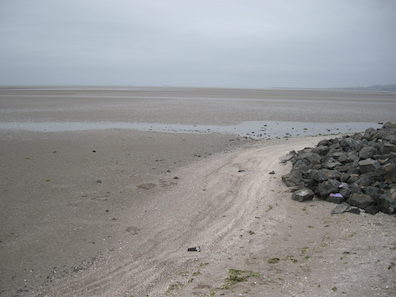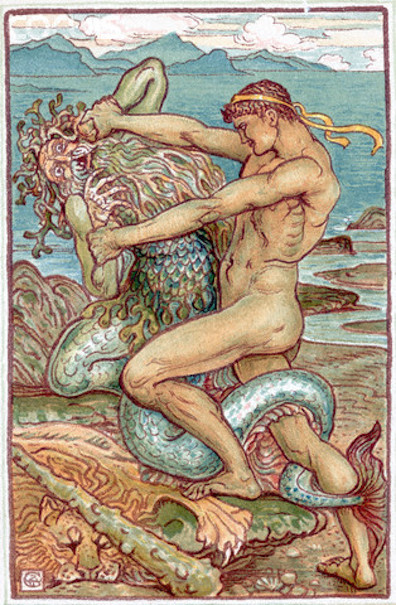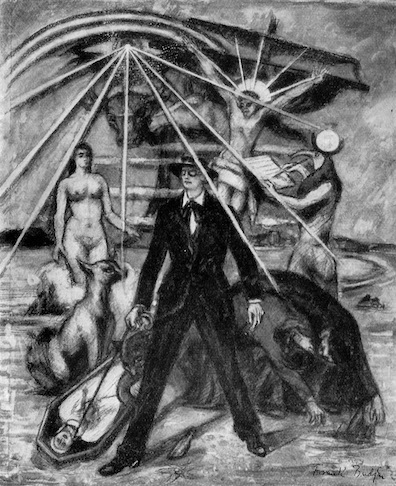In Book 4 of Homer's Odyssey Telemachus has
traveled from Nestor's palace in Pylos to the hall of Menelaus
in Sparta, seeking information about his father. Menelaus
tells him that his journey back from Troy was interrupted when
his ships were becalmed off the sandy island of Pharos, north
of Egypt. Ignorant of which god might have stilled the winds,
and facing starvation, Menelaus was assisted by the nymph
Eidothea, daughter of the sea god Proteus. She told him that
the Old Man of the Sea might answer his question, if Menelaus
could capture him on the beach during his resting hour at noon and hold him fast
while he assumed the shapes "of all the beasts, and water, and
blinding fire." Following her advice, Menelaus ambushed
Proteus when he arrived to nap among his seals on the sand,
endured the transformations, and was rewarded with information
about the winds. He learned also of Odysseus' whereabouts on Calypso's island.
Joyce's chapter does not allude to Menelaus or Eidothea, and
it makes no reference to Proteus until very near the end, when
Stephen thinks briefly of "Old
Father Ocean." It does develop the parallels with
Telemachus. Stephen too has continued
journeying, from Deasy's school south of the Sandycove
tower to the Sandymount beach north of it. Stephen thinks
about his plan to meet Mulligan at "the Ship" at 12:30 (the ambush planned by Antinous
in Book 4), and he resolves not to return to the tower
(affirming his sense of usurpation).
He thinks briefly of his quest for spiritual fatherhood, and
both he and Kevin Egan observe that he resembles Simon
Dedalus, just as Telemachus resembles
Odysseus. At the end of the chapter he sees "a silent
ship" floating into Dublin on the tide, "homing," which
suggests Odysseus' stealthy return
to Ithaca.
But by far the most powerfully suggestive analogue to Homer's
story lies in Stephen's restless, relentless meditations on
change. Everything around him is in flux: the incoming tide,
the changing weather, rotting and rusting objects, burping
sewage gases, people and animals and ships and breezes passing
by. Language, his medium for contemplating the world, is
constantly shifting as English gives way to French, Latin,
Italian, German, Irish, Scottish, Spanish, Greek, Hebrew, and
17th century gypsy "cant." Memories flood in, taking him to
Paris, the slums of Dubin, his aunt's house in Irishtown,
Clongowes Wood College, the Howth tram, the Sandycove tower,
churches, an antiquarian library, a bookstore. Imagination
takes him to scenes of starvation, war, exile, and political
intrigue through all the long centuries. Stephen's internal
landscape too is shot through with change. He replays past follies and pretensions and obsessions and temptations, personal connections that have
helped make him who he is, an imaginary doppelgänger,
another self in a past life,
another self on a distant planet.
The human fear of change is rooted in the fact that life
itself is a transitory phenomenon whose accomplishments, joys,
and satisfactions are threatened by inevitable extinction. The
third of Leopold Bloom's chapters, a journey to the graveyard,
represents Bloom's unsentimental, irreligious contemplation of
mortality. The thoughts in Stephen's third chapter are very
similar. Everywhere he looks he sees death: the shells of
former sea creatures crunching beneath his shoes, a dog
rotting on the seaweed, the corpse of a drowned man surfacing
from its ocean grave, a midwife's bag containing a dead fetus,
bits of wood from the wrecked Spanish Armada, whales stranded
on the beach, Viking rampages, a murdered post office worker,
a buried mother.
It might be argued that all the changes filling Stephen's
consciousness align him with the Proteus of Homer's poem. But
the Linati schema associates Proteus with "Prima materia," the stuff
that Stephen is wrestling with, and identifying him with
Proteus would not take account of his struggle to find
answers. He seems more like Menelaus in his search for
enduring truths amid the flux. His first word, "ineluctable," implies a
desire to struggle out of the illusions of the sensorium into
apprehensions of absolute reality. He searches for Boehmian
mystical signatures,
Berkeleyan ideal signs,
Blakean primal faculties,
the Christian divine substance,
the Edenic paradise, the
Aristotelian "form of forms,"
the "word known to all men" that is love. He seeks the meaning
of a prophetic dream,
rejects attachments that smack of suffocation or entropy, rebukes himself for
the egotistical delusions
and false hopes he has
pursued. He yearns to be loved, to be properly known, to
accomplish the artistic work that he is capable of.
This thread of scrutinizing, aspiring, determined spiritual
search ties the chapter together, and although Stephen does
not acquire definitive answers as Menelaus does, he does enact
something like Menelaus' successful struggle. He stares down
his depressing family connections, his morbid fear of water,
his physical cowardice, his continuing attachment to Catholic
religion, his social and artistic pretensions, his
misogynistic distance from women, his alienation from all
others. A mood of hopefulness infuses the chapter, and becomes
stronger as it proceeds. It is the hope of someone who can
comically and freely accept the world as it is. In beginning
to see the adult he may become, Stephen is both Menelaus
holding fast to his vision of the god, and Telemachus growing
into Odyssean maturity.
As with Nestor, Joyce's two schemas disagree on the
time frame for Proteus, but in this case it is
possible to affirm one over the other. The 10:00 start
specified in the Linati schema probably would not allow
Stephen enough time even to finish
his meeting with Deasy, much less to travel all the way
from Dalkey to Sandymount Strand. And several details in the
text suggest that the hour of noon is approaching. The Gilbert
schema, having been composed later, may here reflect Joyce's
growing understanding of the temporal dimensions of his own
fiction.



